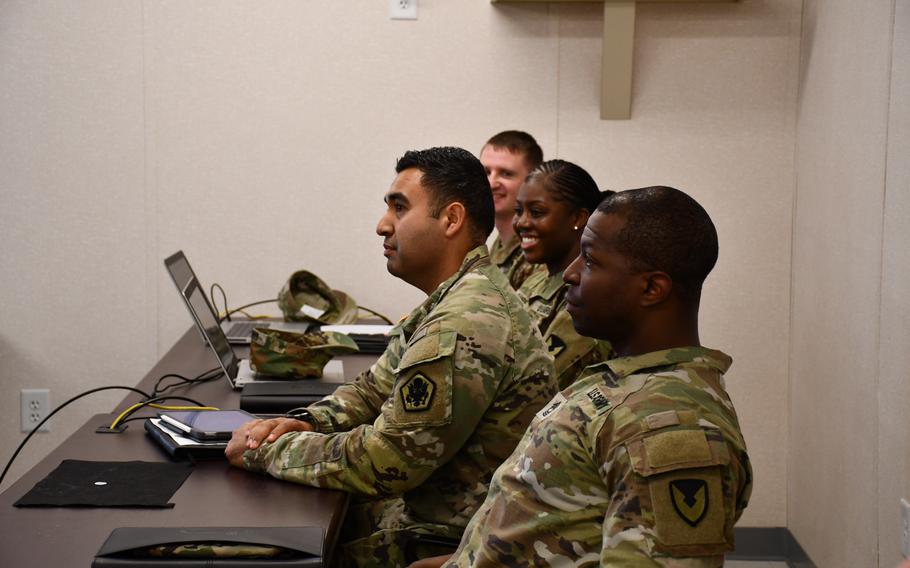
Service members learn about each phase of the Transition Assistance Program by walking through five stations and listening to briefs from several counselors during a TAP open house at Joint Base Myer-Henderson Hall, Va., in March 2022. (Defense Department)
WASHINGTON — Most of the 200,000 service members who become veterans each year are failing to enroll in the Defense Department’s transition assistance program on time, and senators want to know why.
Members of the Senate committees on Armed Services and Veterans’ Affairs said Wednesday that they were concerned troops were not receiving the support that they needed as they moved from the military to civilian life.
In a rare joint hearing, senators fixated on a statistic from a Government Accountability Office report last year that found up to 70% of transitioning troops are not enrolling in the Transition Assistance Program a year before they leave service, as required by law.
“Something is seriously wrong if 70% don’t meet that one-year guideline,” said Sen. Angus King, I-Maine. “That’s a serious problem, and it seems to me that’s an accountability problem.”
The program, commonly called TAP, is administered by the Defense Department in conjunction with the Department of Veterans Affairs and Department of Labor and provides counseling and classes to help service members achieve their post-transition goals.
Attending TAP as early as possible allows transitioning troops to access their veterans benefits faster and provides more opportunities to network with potential employers, said Joshua Jacobs, the undersecretary for benefits for the Department of Veterans Affairs.
“[It] is critical for transitioning service members, given the vast amount of information they need to digest in a compressed time frame,” he said. “The military to civilian transition process brings opportunities for us to improve trust in the VA and support the personal growth of veterans as they navigate this challenging but ultimately rewarding phase of their lives.”
Veterans have a lower unemployment rate than the general population but many face challenges in choosing a career, finding work and deciding which college to attend. Too many transitioning service members, especially those younger than age 40, fail to tap into health care and compensation benefits as soon as they should, Jacobs said.
About 90% of transitioning service members ultimately pass through TAP, but attendance in tailored two-day classes significantly lags, according to the Government Accountability Office. Service branches waived class attendance for more than half of their transitioning troops, and about 22% of service members who need maximum transition support and are required to attend the classes did not go.
“We’re not sure why that occurred,” said John Sawyer, director of education, workforce and income security for the government watchdog agency. “We recommended that the [Defense Department] spend some time evaluating the root causes: is it commander support, is it the culture change, is it mission requirements? What are the reasons that are driving this?”
Ashish Vazirani, the acting undersecretary of defense for personnel and readiness, had no concrete answers for senators Wednesday. He acknowledged only 30% of service members are beginning TAP on time and said the Pentagon is collecting data to understand barriers toward participation.
“We know we need to make improvements,” Vazirani said. “We are working with the military departments and services to make sure that they have the information available about the starting of TAP and the completion of TAP.”
The Pentagon is also observing and watching what commanders are doing and creating a dashboard commanders can use to track how transitioning service members are progressing through TAP, he said.
King said commanders bore much of the responsibility for the lack of timely attendance.
“What would the base commander do if a soldier skipped a mandatory weapons safety class? My suspicion is he or she would make sure they got to that class,” he said.
Sen. Jerry Moran of Kansas, the top Republican on the veterans committee, shared those concerns and said a positive transition experience impacted veteran satisfaction with their military service and their likelihood of recommending service to others.
“I worry that there’s a lack of understanding from commanders about the importance of prioritizing a positive transition and allowing service members time to prepare for their next phase and their families’ [next] phase in their lives,” he said.
More than 500,000 service members are expected to separate or retire from the military in the next few years, according to Sawyer.